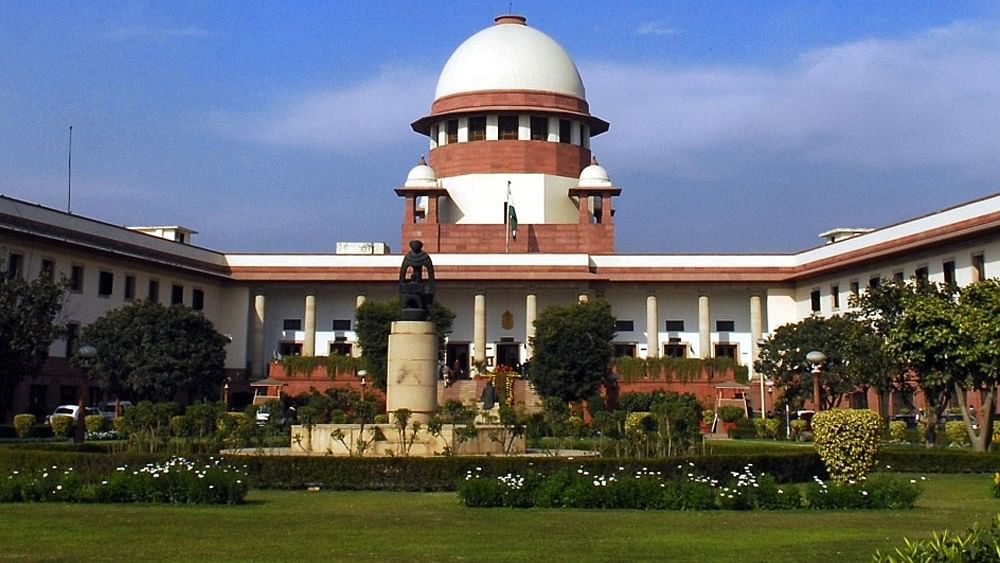
Supreme Court of India.
Credit: PTI File Photo
New Delhi: The Supreme Court on Thursday directed the Election Commission to submit data on donations made to political parties till September 30, 2023 as it reserved its judgement on validity of Electoral Bonds received by the political parties.
A five-judge bench led by Chief Justice of India D Y Chandrachud also observed the Centre could design something which does not have flaws of the present system that puts a premium on opacity.
The court noted the electoral bonds scheme, introduced in January, 2018, reduced the cash in electoral process and encouraged use of authorised banking channels, but there was a need for transparency and there should not be legitimising of kickbacks and quid pro quo between the power centre and benefactors.
After hearing Attorney General R Venkatramani, Solicitor General Tushar Mehta, and rejoinder arguments by senior advocates Kapil Sibal and Vijay Hansaria and advocate Prashant Bhushan, among others, the bench also comprising Justices Sanjiv Khanna, B R Gavai, J B Pardiwala, and Manoj Misra, wrapped up the hearing on the clutch of petitions challenging the validity of the Centre's electoral bonds scheme as a source of political funding.
Before rising, the bench directed the EC to get the data in accordance with the order passed by the apex court in April 2019, till the period ending on September 30, 2023.
“On April 12, 2019, an interim direction was issued by this court to the EC. The ECI has produced in a sealed packet data as per the interim order April 2019. The order of this court was not restricted to the date on which it was pronounced. If there was any ambiguity it was necessary for the ECI to seek a clarification from this court. Any event, we now direct ECI to produce up to date data until September 30, 2023…..This exercise should be carried out within a period of two weeks. Data in a sealed packet should be handed over to the registrar judicial of this court," the bench said in its order.
During the hearing, the bench asked advocate Amit Sharma, appearing for the EC why no data was submitted after 2019 despite the order, and said that the commission was to continue collecting the data.
The bench told advocate Amit Sharma, representing EC, it didn't freeze the data which was to be maintained.
“You were to continue collecting the data. You should have asked us," the bench told Sharma, who said it was not possible due to the order passed by this court subsequently in March 2021.
The bench said that was an application for stay on the electoral bonds scheme and a fresh window was opening up then.
"You should have got the data when you were coming to the court," the bench said.
Earlier, during the hearing, the bench also asked the EC's counsel as to what extent its concerns to the scheme made through a letter was assuaged.
Sharma said there were three categories - one is below Rs 2000, other is between Rs 2000-20,000, and the third is for donations above 20,000 that are to be done mandatorily by way of DD/ECS.
He said, "We were mostly concerned non availability of data and the source."
The bench said that it will not ask SBI to reveal the identity of donors at this stage, and nobody is interested in it at the present stage but that it would like to know the quantum.
The bench also emphasised that it was for the legislature and the executive to draw the balance, saying it is not that either you have this or you go back to the entire cash system. "How it is to be done, we will not enter that arena,” the bench said.
The bench also pointed out there was a cap that a company’s donation would be related to its percentage of net profit, which means that a company must be in a position to have net profits. Initially, it was 5 per cent then it became 7.5 per cent under the 2013 Act, and the company may have zero profits, it may have zero turnover but it makes a donation.
Mehta said so far as the condition with regards to profit - a non-profit company cannot donate, because then a shell company can donate, which defeats the objective and the government has removed 2.3 lakh shell companies from the system. The bench asked Mehta if the government will bring an amendment in the Companies Act.
Mehta said amending is a legislative function, which he cannot decide. The bench asked him further, if the government is making a statement that it will amend the Companies Act to bring back the provision where donations will be a percentage of net profit. Mehta said that a profit-making company can donate. The bench said the situation should not be that a company, making Re one as profit, will make a donation of Rs 100 crore.
